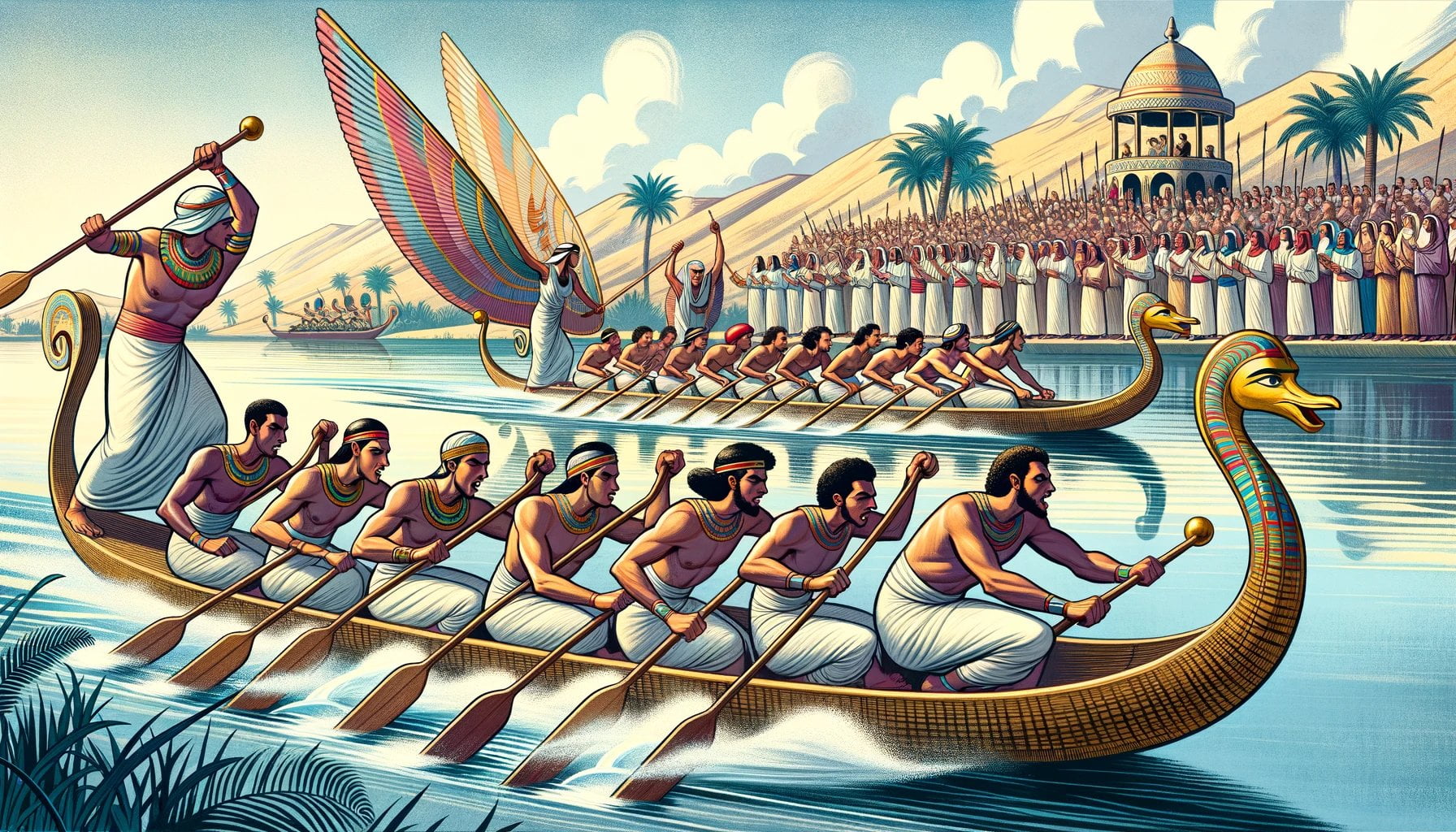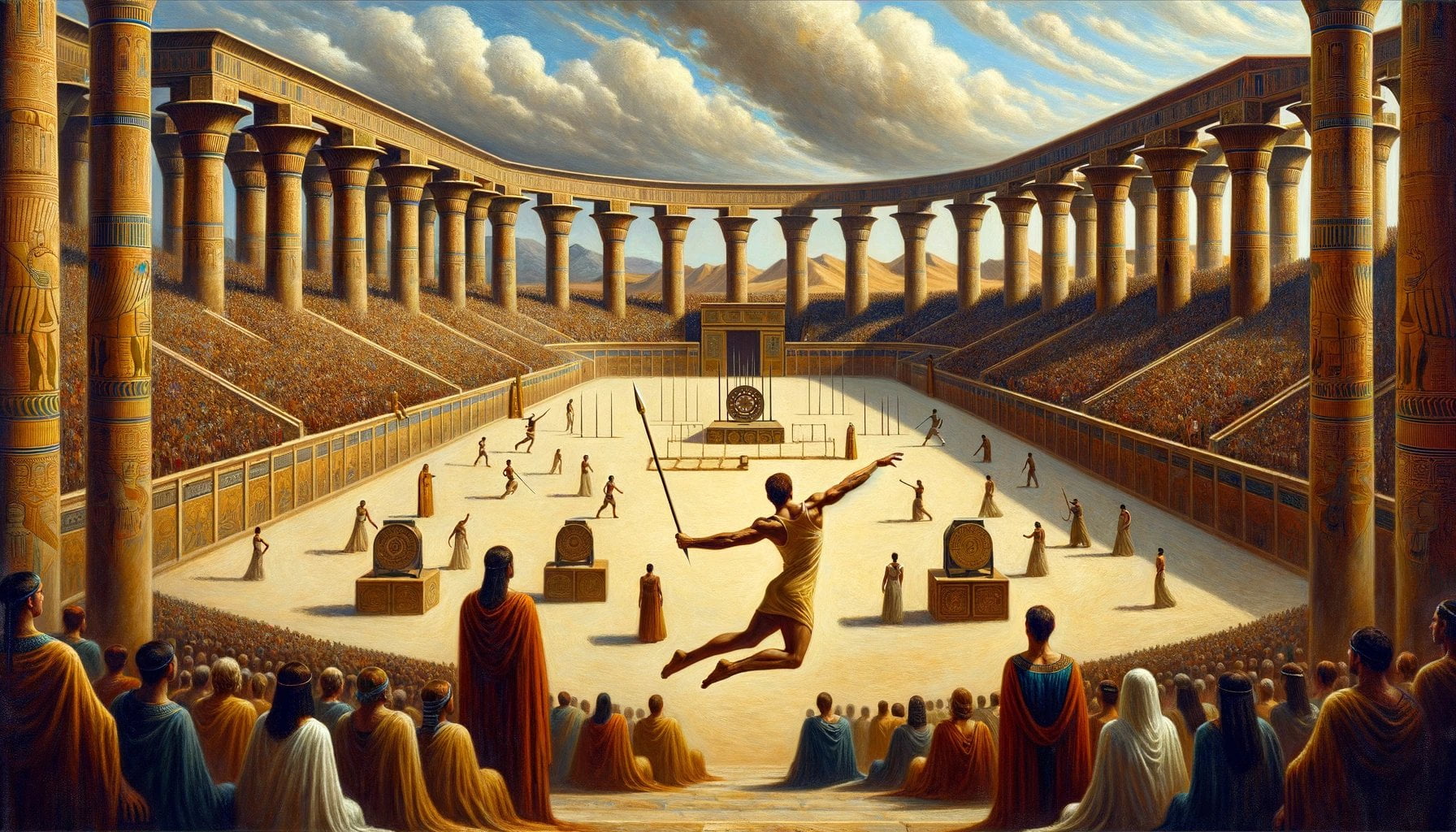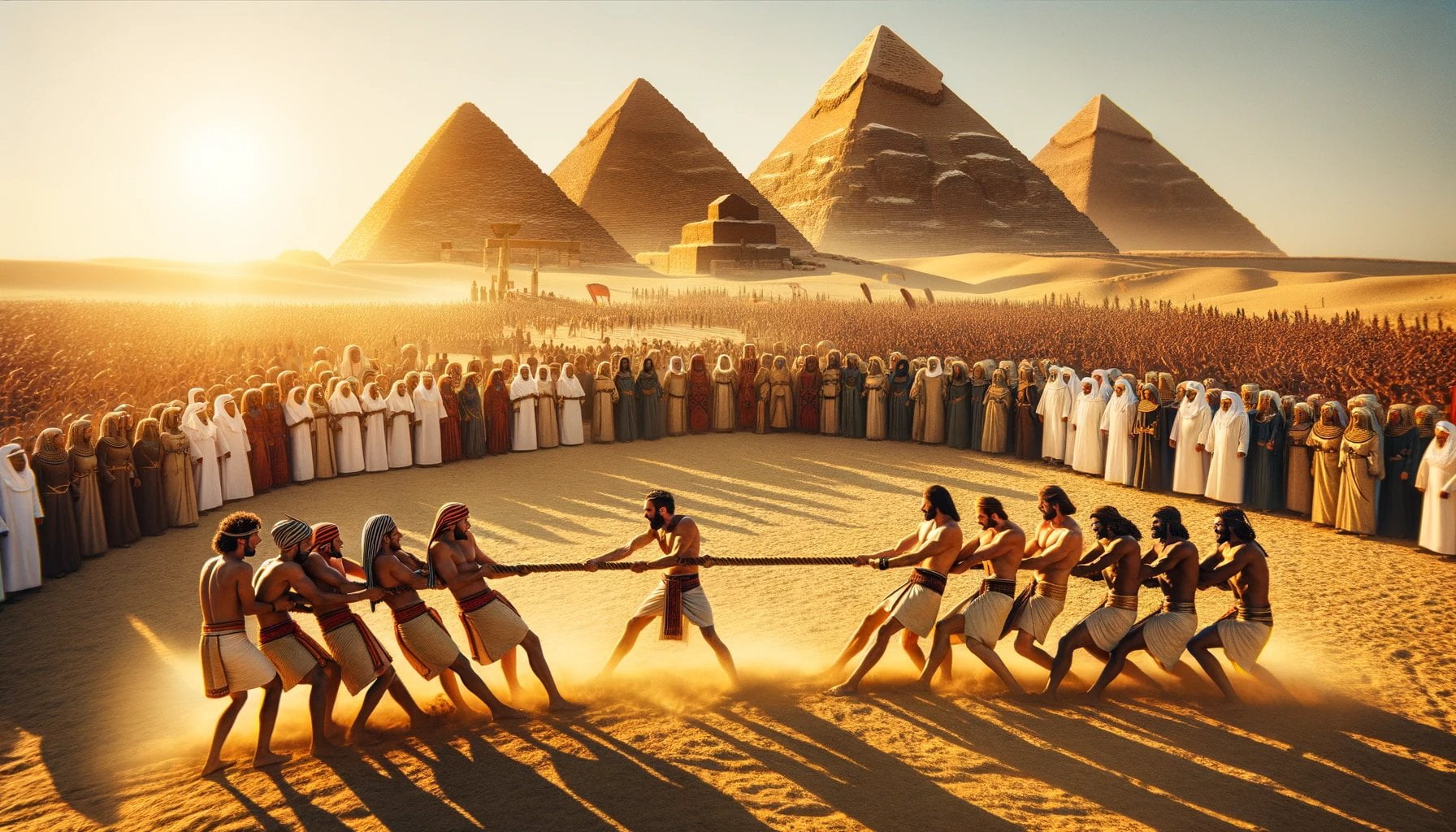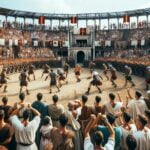Unraveling Ancient Egypt’s Sports: Exploring the Forgotten Games takes you on a captivating journey into the world of sports in Ancient Egypt. Step back in time as we delve into the culture, traditions, and practices of this ancient civilization, focusing specifically on the fascinating array of sporting events that once entertained and captivated its citizens. From the intricacies of their games to the social and religious implications, this article reveals the often-overlooked aspect of Ancient Egypt, shedding light on the rich tapestry of sports that played a significant role in shaping their daily lives. Join us as we unravel the mysteries of the forgotten games of Ancient Egypt.

Key Takeaways:
- Ancient Egyptians participated in a variety of sports for training, recreation, and religious purposes.
- Common sports included wrestling, boxing, archery, weightlifting, javelin throwing, swimming, and ball games.
- Javelin throwing and archery were popular for hunting and fishing.
- Gymnastics, marathon, high jump, rowing, and balance were also practiced by ancient Egyptians.
- Sports competitions were encouraged and attended by kings, princes, and statesmen.
- Sports were incorporated into religious ceremonies and festivals.
- Physical fitness and sports were important for maintaining health and vigor.
- The ancient Egyptians enjoyed games and toys, including board games like Senet.
- Swimming was a favorite sport, practiced in the Nile River and swimming pools.
- Ancient Egyptians had their own version of field hockey using palm fronds and papyrus balls.
- Success in sports may have been determined by skill, strength, and sportsmanship.
- Sports played a role in preparing warriors for battle.
Ancient Egypt Sports
Sports have been an integral part of human civilization since ancient times, and Ancient Egypt was no exception. The ancient Egyptians had a deep appreciation for physical activities and engaged in a wide array of sports, which served them in various aspects of life, including warfare, hunting, and entertainment.
A Tapestry of Sports
Ancient Egypt boasted a rich assortment of sports, many of which are still popular to this day. From wrestling and boxing to archery and weightlifting, the Egyptians explored a diverse range of physical activities. They also indulged in swimming, various ball games, gymnastics, marathons, high jumps, rowing, and balance exercises. These sports not only promoted physical fitness but also enhanced the mental and spiritual well-being of the ancient Egyptians.
A Fascination with Hunting
Javelin throwing and archery were not only beloved sports but also served practical purposes. The skill in throwing a javelin or shooting an arrow was essential for successful hunting and fishing. These sports provided training for the ancient Egyptians in procuring food and mastering the art of survival in their environment.
Sports as Recreation and Celebration
Sports were not limited to practical applications alone. Ancient Egyptian kings, princes, and statesmen actively promoted and attended sports competitions as a form of recreation and entertainment. These events brought the community together to celebrate skill, strength, and sportsmanship. Moreover, sports were an integral part of religious ceremonies and festivals, symbolizing the harmony between physical and spiritual realms.
A Testament to Vigor and Skill
Ancient Egyptians valued physical fitness, recognizing its importance in maintaining health and vitality. Engaging in sports activities helped them build strength, endurance, and agility. Success in sports was measured by one’s skill, strength, and ability to display good sportsmanship, qualities that were highly esteemed in Egyptian society.
Playful Pastimes and Games
In addition to organized sports, ancient Egyptians also enjoyed lighter forms of recreation. Games and toys were an integral part of their leisure time, with board games like Senet being particularly popular. These games provided mental stimulation and served as a means of social interaction.
Making Waves in the Nile
Swimming held a special place in the hearts of ancient Egyptians. The Nile River and swimming pools provided the perfect setting for practicing swimming techniques and enjoying leisurely swims. Swimming was not only a sport but also a respite from the scorching Egyptian summers.
Field Hockey, Egyptian Style
Ancient Egypt had its own version of field hockey, utilizing palm fronds and papyrus balls. This fast-paced and energetic game allowed the Egyptians to showcase their dexterity and teamwork. It provided an outlet for friendly competition and brought people of all walks of life together.
Preparing for Battle
Sports played an important role in preparing warriors for battle. By honing their physical prowess and combat skills through sports, ancient Egyptian soldiers were better prepared to protect their land and people. These sports acted as a training ground, fostering discipline, resilience, and strategic thinking.
In conclusion, ancient Egypt’s fascination with sports reveals a society that valued physical fitness, skill, and the strengthening of the mind, body, and spirit. Through sports, the ancient Egyptians found joy, built their communities, and prepared for the various challenges life presented to them. The legacy of their sporting traditions continues to resonate with us today, reminding us of the enduring human spirit to strive for greatness through physical pursuits.
Ancient Temples of Egypt are a fascinating glimpse into the rich history and culture of this ancient civilization. If you want to explore these awe-inspiring structures yourself, click here to uncover their secrets.
Social and Religious Significance of Sports in Ancient Egypt
Imagine for a moment standing in the midst of a bustling crowd, surrounded by cheers and laughter, as the Egyptian sun bathes you in its warm glow. You are witnessing a spectacle that is much more than just a display of physical prowess—it is a window into the rich tapestry of social and religious life in Ancient Egypt.
Sports: More Than Just a Game
In the vibrant civilization of Ancient Egypt, sports held a profound significance that extended far beyond mere recreation or competition. These sporting events were deeply intertwined with the social fabric of Egyptian society, serving as a means of fostering unity, camaraderie, and physical fitness. [The social and religious significance of sports in Ancient Egypt] is a testament to the remarkable way in which sports wove themselves into the very essence of daily life.
Physical Fitness and its Role
Physical fitness was highly valued in Ancient Egyptian society, and engaging in various sports and athletic activities was key to maintaining one’s health and vigor. From events that required teamwork and strength, such as wrestling and rowing, to exercises that emphasized agility and coordination, like gymnastics and balance exercises, the Egyptians embraced a diverse range of sports to ensure their physical well-being. Through these activities, they built not just muscular strength, but also resilience, discipline, and a competitive spirit that prepared them for the challenges of daily life.
Sports as a Social Gathering
Sports served as a powerful means of uniting the people of Ancient Egypt, transcending social boundaries and bringing them together in joyous celebration. The Kings, princes, and statesmen delighted in attending sports competitions, recognizing their importance as a cornerstone of social interaction and entertainment. These grand spectacles fostered a sense of community spirit, allowing individuals from all walks of life to gather and revel in the skill and sportsmanship displayed by the athletes.
A Window into Religious Beliefs
In Ancient Egypt, religion permeated every aspect of society, and sports were no exception. Many sporting events were imbued with religious significance, serving as avenues of worship and devotion. For example, the ancient Egyptian version of field hockey not only provided a forum for friendly competition, but also symbolized the battle between good and evil. The game was believed to mirror the cosmic struggle between the god Horus and his evil uncle Seth, reinforcing religious ideologies and imparting valuable life lessons to the participants.
Sports: A Pathway to the Divine
Ancient Egyptians firmly believed that sports provided a pathway to connect with the divine realm. Athletic competitions were often held in the honor of deities, with offerings and prayers made before and after the events. These rituals emphasized the sacred nature of sports, elevating them beyond mere physical endeavors. The Egyptian people saw their participation in sports as a means of attaining spiritual enlightenment, a way to honor the gods, and a pathway to a higher state of being.
Key Takeaways:
- Sports in Ancient Egypt went beyond mere physical recreation, holding social and religious significance.
- Physical fitness was highly valued, and sports played a vital role in maintaining health and vigor.
- Sports brought the community together, fostering unity and camaraderie among people of all social strata.
- Many sporting events had religious connotations and were seen as avenues of worship and devotion.
- Participating in sports was believed to connect individuals with the divine realm, offering a pathway to spiritual enlightenment.
As we delve into the world of Ancient Egyptian sports, we uncover not just a history of athletic prowess, but a profound reflection of society, spirituality, and the human desire for physical achievement. Through their sports, the ancient Egyptians simultaneously embraced strength and spirituality, fostering a legacy that continues to captivate us to this day.
Sports venues and infrastructure in Ancient Egypt
As we delve into the fascinating world of sports in Ancient Egypt, it’s important to consider the venues and infrastructure that shaped these ancient athletic pursuits. Let’s uncover the secrets behind the sports venues and infrastructure in Ancient Egypt, shedding light on the forgotten arenas where these games were played.
Ancient Egyptian Sporting Arenas: More Than Meets the Eye
When picturing ancient sports venues, we may imagine grand stadiums or intricately built arenas. However, in Ancient Egypt, the concept of sports venues and infrastructure was quite different. The majority of sporting activities took place in open spaces, where the natural landscape served as the setting for various sports.
The Nile River: Undoubtedly, the most iconic and versatile sports venue in Ancient Egypt was the mighty Nile River. This majestic water body not only provided a means of transport and sustenance for the ancient Egyptians but also served as an arena for swimming contests. The river’s gentle currents and cool waters offered a refreshing respite from the scorching desert heat, making it an ideal location for competitive swimming.
Open Fields: Beyond the Nile River, open fields played a significant role in Ancient Egyptian sports. These vast expanses of land served as gathering places for various sporting events. Whether it was wrestling, weightlifting, long jumps, or marathons, these open fields became the arenas where ancient athletes showcased their prowess and competed for glory.
Sacred Grounds: Sports in Ancient Egypt were often intertwined with religious ceremonies and festivals. As a result, sacred grounds, such as temples and religious complexes, also doubled as venues for sporting events. The participation of gods in matches and athletics further enhanced the religious significance of these locations.
While the physical structures of sporting venues in Ancient Egypt may not have been elaborate, the spirit and passion that permeated these open spaces made them truly remarkable arenas of athleticism.
Key Takeaways:
- Sporting activities in Ancient Egypt largely took place in open spaces such as fields and the Nile River.
- The Nile River served as a venue for swimming contests, providing a refreshing escape from the desert heat.
- Open fields acted as versatile arenas for various sports, including wrestling, weightlifting, long jumps, and marathons.
- Religious sites, such as temples and religious complexes, also hosted sporting events, adding a spiritual dimension to the competitions.
In conclusion, understanding the sports venues and infrastructure in Ancient Egypt allows us to paint a vivid picture of the ancient athletic landscape. From the banks of the Nile River to the open fields and sacred grounds, these venues not only witnessed displays of physical prowess but also embodied the cultural and religious significance of sports in Ancient Egypt.
Legacy and Influence of Ancient Egyptian Sports
Ancient Egypt holds a captivating legacy that reaches far beyond its architectural wonders and mystical mythology. A lesser-known aspect of this ancient civilization lies in its rich tapestry of sports, which played a significant role in shaping everyday life for its citizens. The legacy and influence of Ancient Egyptian sports continue to resonate today, reminding us of the human spirit’s pursuit of physical achievement and the enduring impact of this remarkable society.
Unleashing the Secrets: Exploring Forgotten Games
As we delve into the captivating realm of Ancient Egyptian sports, we uncover a multitude of intriguing and often overlooked games that held both social and religious significance. These ancient sporting traditions were deeply ingrained in the fabric of society, reflecting its values, spirituality, and the innate human desire to excel physically.
Key Takeaways:
– Ancient Egyptian sports played a vital role in maintaining community unity and camaraderie.
– Sporting events were not only seen as avenues of physical achievement but also as acts of worship and offerings to the gods.
– Engaging in sports was believed to provide a connection to the divine realm, bridging the gap between mortals and the gods.
– Open fields, such as the banks of the Nile River or designated arenas, served as versatile venues for various sports activities.
– Religious sites, like temples and complexes, hosted sporting events, infusing them with a spiritual dimension.
From Physical Fitness to Pharaonic Rule: The Impact of Ancient Egyptian Sports
In the realm of Ancient Egypt, physical fitness was not only valued but also intertwined with the ability to govern. The “Heb-Sed” festival, a celebration held approximately every thirty years to rejuvenate the reigning pharaoh’s vitality, emphasized the importance of the ruler’s physical prowess. This grand event included various athletic competitions as a demonstration of the pharaoh’s strength, endurance, and agility.
Ancient Egyptian sports extended their influence far beyond the boundaries of the Nile. Today, we can observe glimpses of their legacy in modern games and sports. The precision and skill exhibited in activities such as wrestling, weightlifting, archery, and swimming continue to inspire their contemporary counterparts.
Unmasking the Sporting Arena: Ancient Egyptian Games and Sports
In the bustling streets and open spaces of Ancient Egypt, citizens reveled in a diverse range of games and sports. Wrestling, weightlifting, long jump, swimming, rowing, shooting, and ball games were among the most popular pursuits. These activities were not only sources of physical exercise but also fostered discipline, resilience, and strategic thinking, essential qualities desired in both athletes and warriors.
Key Takeaways:
– Wrestling, an ancient sport that required strength and agility, was a cornerstone of the sporting culture.
– Weightlifting showcased impressive feats of strength, where participants aimed to lift heavy objects to demonstrate their physical prowess.
– Archery, popular both as a sport and for hunting purposes, showcased precision and skill in a setting of friendly competition.
– Swimming held a special place in the hearts of ancient Egyptians, providing a refreshing escape from the scorching desert heat and an opportunity to practice swimming techniques.
– Ball games, such as the Ancient Egyptian version of field hockey, brought people from diverse backgrounds together through friendly competition.
A Glimpse into Ancient Sporting Culture: Unique Characteristics and Significance
Ancient Egyptian sports culture boasted unique characteristics that set it apart from other ancient civilizations. The integration of sports matches and athletics into religious ceremonies and festivals, such as the mock battles between the followers of Horus and Set, exemplifies the profound impact these activities had on daily life. These events not only showcased athletic skill but also served as offerings to the gods, cementing the religious significance of sports.
Storytelling also held a special place in Ancient Egyptian recreation culture. Through tales of athletic heroes and legendary sporting events, their society nurtured a sense of pride, shared memories, and shared values.
Rediscovering Ancient Egypt: The True Essence of Sports
As we unravel the legacy and influence of Ancient Egyptian sports, we discover a society that celebrated the human form, prized physical achievement, and recognized the deeper spiritual connection embedded within sports. This captivating civilization’s love for sports captivates us even today, reminding us of our shared humanity and the enduring pursuit of greatness through physical pursuits.
In the forgotten games of Ancient Egypt lie the hidden stories of a civilization’s aspirations, traditions, and the legacy they left behind. Let us explore this captivating world, embracing the rich tapestry of sports that shaped significant aspects of their lives and continue to inspire us with their echoes through time.
Key Takeaways:
– Ancient Egyptian sports held social and religious significance, fostering community unity and serving as offerings to the gods.
– The impact of Ancient Egyptian sports extended beyond physical fitness, playing a role in the governance and rejuvenation of pharaohs.
– Modern games and sports often draw inspiration from the precision and skill exhibited in ancient Egyptian sporting activities.
– Wrestling, weightlifting, archery, swimming, and ball games were among the popular sports enjoyed by ancient Egyptians.
– Ancient Egyptian sports showcased attributes such as discipline, resilience, and strategic thinking.
– Integration of sports into religious ceremonies and festivals highlighted their unique cultural and spiritual significance.
– Storytelling played a vital role in cultivating a sense of pride and shared values within ancient Egyptian sporting culture.
References:
Ancient Egypt. (n.d.). https://education.nationalgeographic.org/resource/resource-library-ancient-egypt/
Bowman, A. K., Wente, E. F., Dorman, P. F., Samuel, A. E., & Baines, J. R. (2023, September 30). Ancient Egypt | History, Government, Culture, Map, & Facts. Encyclopedia Britannica. https://www.britannica.com/place/ancient-Egypt
Ancient Egypt. (2023, September 27). Wikipedia. https://en.wikipedia.org/wiki/Ancient_Egypt

FAQ
Q1: What were some popular sports in Ancient Egypt?
A1: Some popular sports in Ancient Egypt included wrestling, weightlifting, long jump, swimming, rowing, shooting, and various ball games.
Q2: How did sports play a role in Ancient Egyptian society?
A2: Sports in Ancient Egypt were significant as they helped athletes train for war and work projects, showed off their strength and skill, and provided fun and enjoyment for the community. They were also part of religious ceremonies and festivals.
Q3: How did Ancient Egyptians practice swimming?
A3: Ancient Egyptians practiced swimming in the Nile River and swimming pools. Swimming was a favorite sport in Ancient Egypt.
Q4: Were there any team sports in Ancient Egypt?
A4: Yes, team sports were popular in Ancient Egypt. Hockey, tug-of-war, and field hockey were among the team sports played during that time.
Q5: What was the significance of sports in Ancient Egyptian culture?
A5: Sports played an important role in maintaining physical fitness and vigor in Ancient Egyptian society. They were valued by both kings and commoners, and their practice had cultural and ethnic significance. Ancient Egyptian sports have also influenced modern games and sports.









